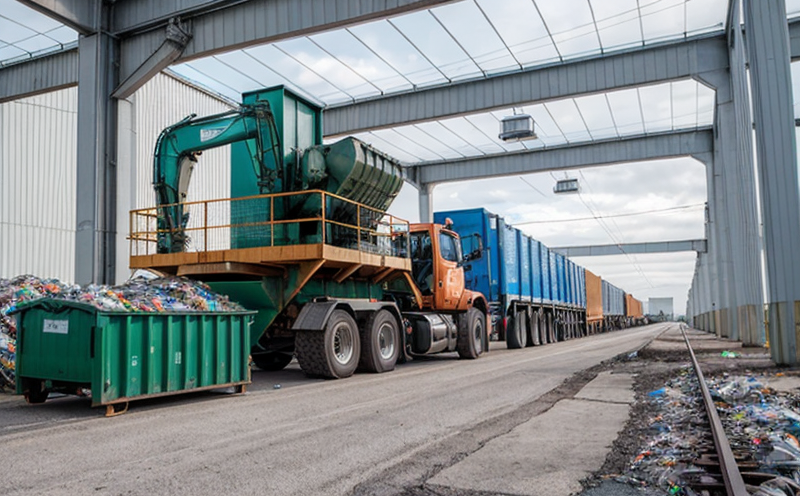ASTM D8173 Plastic Film Recycling Testing
The ASTM D8173 standard provides a comprehensive approach to evaluating plastic films used in various recycling processes. This testing method is crucial for ensuring that recycled plastics meet the quality standards required for reuse, thereby contributing to sustainable manufacturing practices.
ASTM D8173 outlines specific procedures and criteria to assess the characteristics of recycled plastic films. The primary focus is on determining whether these materials can be effectively reused in industrial processes without compromising product integrity or performance. This testing ensures that recycling efforts align with broader sustainability goals within the manufacturing sector.
The process involves several key steps, including sample preparation, conditioning, and subsequent mechanical testing. Samples are prepared by cutting them into standard sizes and shapes, then conditioned to a specific temperature and humidity level before undergoing various tests. These tests assess physical properties such as tensile strength, elongation at break, impact resistance, and flexibility. Additionally, chemical analysis ensures that recycled materials do not contain harmful substances.
By adhering strictly to ASTM D8173 guidelines, manufacturers can verify the quality of their recycled plastic films, ensuring compliance with industry standards. This is particularly important in sectors where product safety and environmental impact are paramount considerations.
The results from these tests provide valuable insights into the performance characteristics of recycled plastics, helping companies make informed decisions about raw material selection and process optimization. In doing so, they contribute to reducing waste generation and promoting circular economy principles across industrial manufacturing processes.
Understanding the nuances of ASTM D8173 testing is essential for quality managers, compliance officers, R&D engineers, and procurement professionals working in industries reliant on sustainable practices. Familiarity with this standard enables them to better integrate recycled materials into their operations while maintaining high-quality standards.
Benefits
Conducting ASTM D8173 Plastic Film Recycling Testing offers numerous advantages for industrial manufacturers and processors focused on sustainability. By ensuring that recycled plastic films meet stringent quality criteria, businesses can:
- Elevate their reputation as leaders in environmental stewardship.
- Enhance product reliability by reducing variability in material performance.
- Increase market competitiveness through compliance with regulatory requirements.
- Promote employee awareness and engagement regarding sustainable practices.
- Reduce operational costs associated with sourcing raw materials.
These benefits underscore the importance of implementing ASTM D8173 testing protocols within industrial settings, particularly those committed to advancing circular economy initiatives.
Industry Applications
| Industry Sector | Specific Applications |
|---|---|
| Packaging | Evaluating the durability and adaptability of recycled plastic films used in packaging solutions. |
| Consumer Goods | Assessing the suitability of recycled plastics for consumer goods manufacturing processes. |
| Petrochemicals | Determining the recyclability and performance characteristics of plastic films used in petrochemical applications. |
| Automotive | Testing recycled plastics for use in automotive components where lightweighting and sustainability are critical. |
Quality and Reliability Assurance
The ASTM D8173 testing process plays a vital role in maintaining the integrity of plastic films throughout their lifecycle, from raw material sourcing to end-of-life disposal. Through rigorous evaluation, this standard helps ensure that recycled plastics maintain consistent quality levels across different manufacturing processes.
For instance, tensile strength tests help determine how well recycled plastic films can withstand mechanical stress without failing, which is crucial for applications requiring robust packaging solutions or durable automotive parts. Similarly, impact resistance assessments provide valuable data on a material's ability to absorb energy before fracturing, ensuring safety and reliability in various industrial contexts.
Chemical analysis further enhances the accuracy of ASTM D8173 testing by identifying any potential contaminants that might compromise product quality or pose health risks. By incorporating these elements into their quality assurance programs, manufacturers can confidently use recycled plastics while adhering to strict regulatory standards.
This commitment not only supports sustainable manufacturing practices but also fosters trust among consumers and stakeholders who value eco-friendly initiatives. Ultimately, adherence to ASTM D8173 ensures that industrial operations remain compliant with international norms such as ISO 14001 for environmental management systems.





